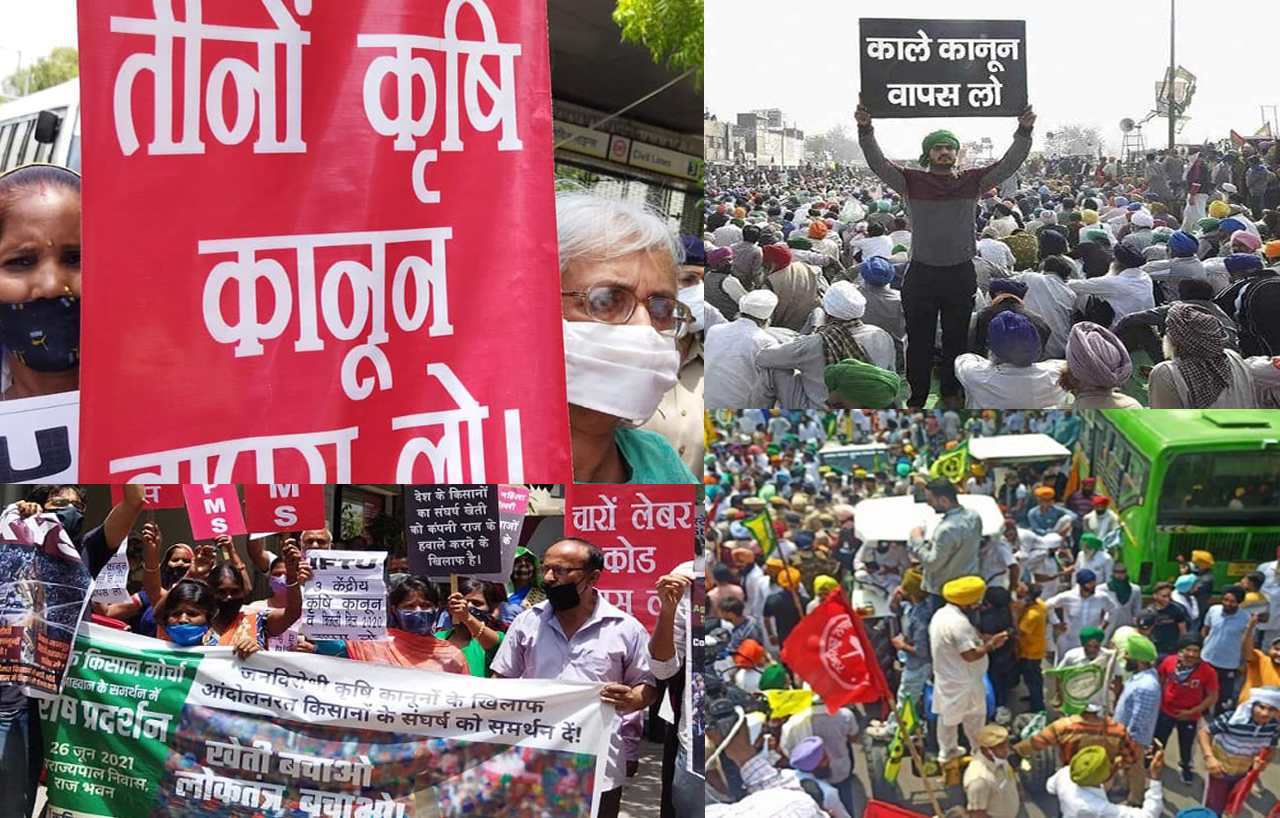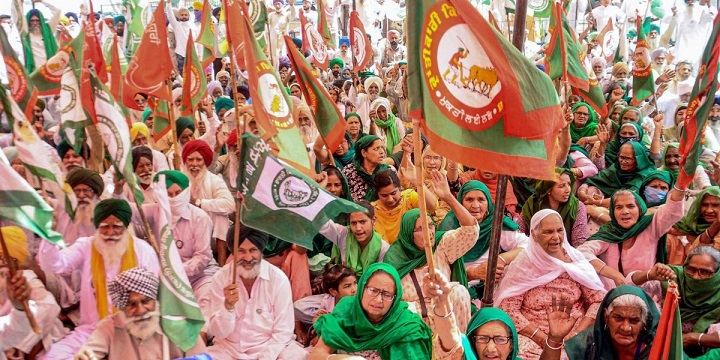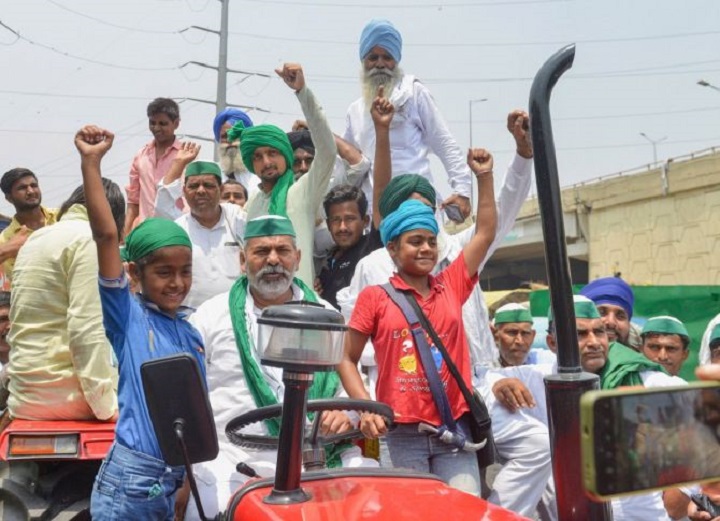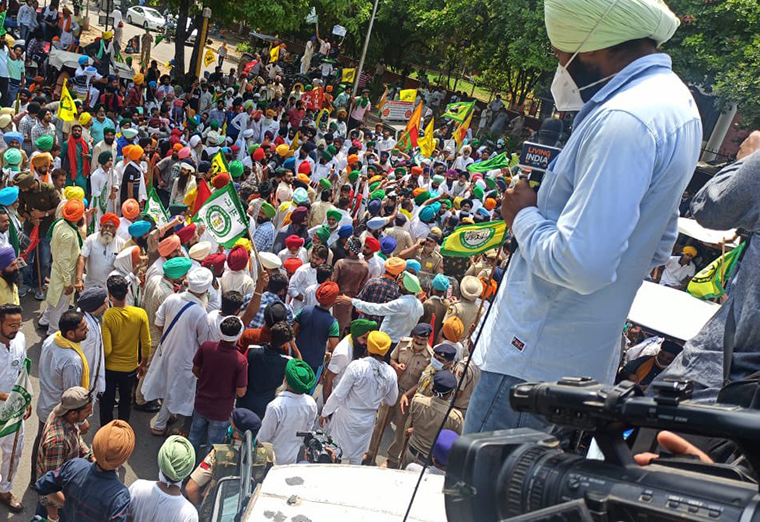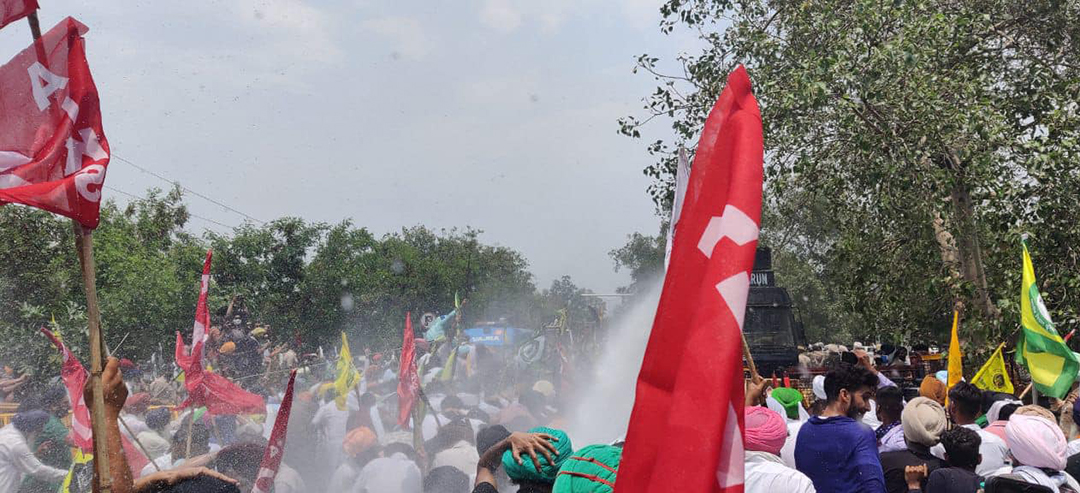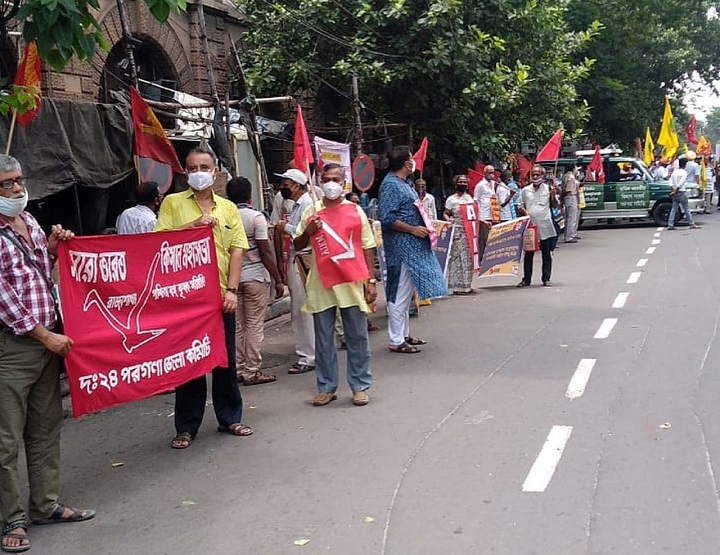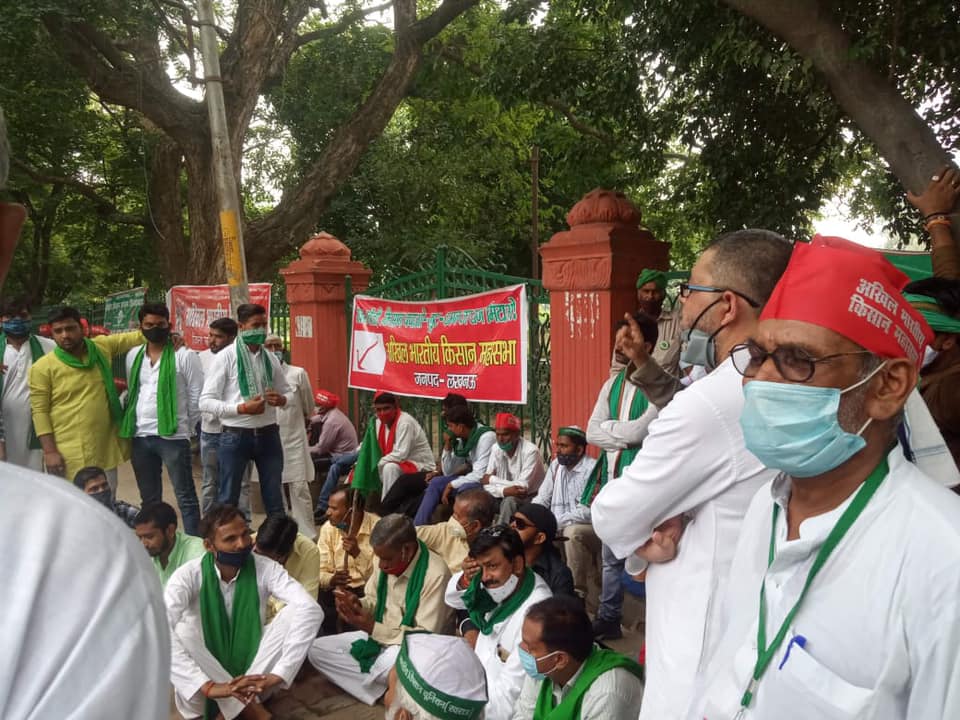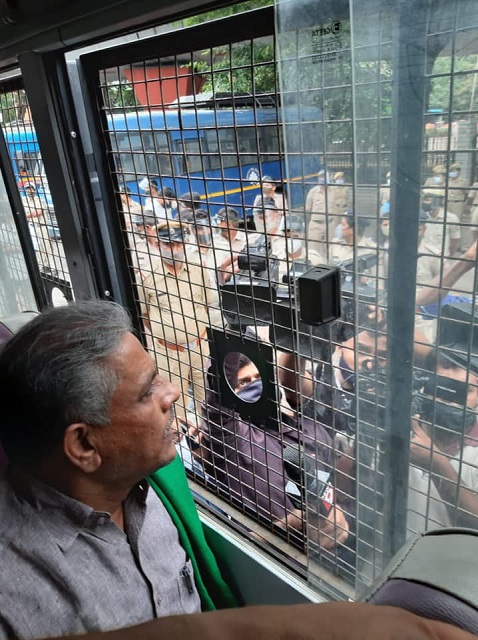The farmers have, through their 7-month long struggle, realised that to make any meaningful progress, the struggle needs to be advanced to a new stage. Their agitation against the neoliberal onslaught on agriculture needs to be connected and integrated with a bigger countrywide political mass movement for Democracy against Fascism. It is this realisation that is being expressed by their call to observe “Save Democracy, Save Farmers” day on 26 June and “Hul Kranti Diwas” on 30 June 2021, writes Amit Jugnu.
The country is slowly limping out of the second wave of the pandemic. It’s devastating trails, horror and mayhem are still fresh in our memories. Just when we thought that the worst might be over, we are being told of yet another more contagious and deadly mutation variant of the virus slowly spreading and growing, ready to overwhelm us with a third wave in the coming months. Lockdowns, corona-curfews, restrictions on travel and movement, corona appropriate behaviour have become new norms through which we lead our lives. The virus is deadly, but so are the means to contain its spread which criminalises the means of livelihood for millions, particularly of those who survive on the ‘Pakora-economy’ or work in what we call the informal sector. Dissent, protests, rallies and agitations against the rulers, and their policies of turning the pandemic into an opportunity to milk more profits, are sacrilegious and have been made unlawful under the Disaster Management Act in force.
We have all but forgotten that amidst all these despairing reality, thousands of farmers are still camping on the borders of the nation’s capital city, braving not only the deadly wave of the pandemic, but also the might of the Indian state, the toxic disinformation campaign by its various agencies, including the media.
The Samyukt Kisan Morcha (SKM), an umbrella body of farmer unions leading the protests, called farmers and their unions across the country to observe 26 June 2021, as “Kheti Bachao, Loktantra Bachao” (Save Farming, Save Democracy) day. The day marked the completion of seven months of the farmers’ protests on Delhi borders, and also possibly more importantly, it also marked the 47th anniversary of imposition of Emergency in India, in 1974, by the then PM, Ms. Indira Gandhi. The farmers’ agitation on the borders of Delhi began in November 2020, against the union government’s three contentious agriculture laws enacted in September 2020. Thousands of farmers have since then been camping at these various border points demanding rollback of the three farm legislations and a new law to guarantee minimum support price (MSP) for their yields.
According to a statement released by SKM, farmers all over the country in various state capitals, submitted a memorandum addressed to the President of India, expressing their deep anguish and indignation about the twin challenge of saving ‘our agriculture and saving our democracy’. The memorandum reiterated their main demands of getting 3 anti-farmer laws repealed, and to get a legal guarantee of MSP for their produce.
The protests across the country:
While in Punjab, Haryana and western Uttar Pradesh— the nerve center of the ongoing seven month long protest — huge rallies of farmers, defying police barricades, marched towards Governor house to submit the memorandum, in many other parts of the country, the farmers, union leaders and activists, took out rallies, held demonstrations in solidarity with the struggle and protested outside the Governor House.
In Haryana, farmers from several parts of the state gathered at Nada Sahib Gurudwara in Panchkula, and headed towards the Raj Bhavan.
Thousands of farmers from Saharanpur and Sisauli in western Uttar Pradesh reached Ghazipur Gate led by BKU chief Rakesh Tikait.
Massive crowd of farmers assembled near Raj Bhawan, Sec 17-18, Chandigarh on tractors, buses & cars
Breaking barricades, facing water cannons, thousands of farmers on way to Chandigarh to gherao Punjab, Haryana Raj Bhavans
West Bengal: Farmers protesting outside the Raj Bhawan, Kolkata
Farmer’s delegation in Lucknow went to the Governor House to submit ‘Rosh Patra’ addressed to the President of India
But in many states, particularly those ruled by BJP, the police picked up and detained peaceful protestors. In Karnataka, Uttarakhand, Madhya Pradesh, Telangana etc., the police picked up protesting farmers from their assembly points, and did not allow them to march to Raj Bhavan.
Farmer leaders at Bangalore in Karnataka were detained in High Ground Police Station,
In Delhi, protestors were initially not allowed to meet with the Lieutenant Governor, and were picked up and taken to Wazirabad Police Training Centre. Later on, however, a virtual brief meeting was arranged with the LG, and the memorandum was handed over to his representative. Earlier in the day, Poonam Kaushik, coordinator of Delhi for Farmers, was kept confined to her home by the Delhi Police. Many leaders and members of IFTU were also detained when they gathered at the Civil Line Metro Station.
The Memorandum
The memorandum addressed to the President accused the union government of thrusting on the farmers’ laws through ‘unconstitutional’ and ‘undemocratic’ means which will destroy farming and snatch agriculture from farmers’ hands, and hand it over to big corporations. It states that the historical farmers’ movement is not only a movement to save farming and farmers of the country, but also the democracy of our country. Reminding the President that he had taken “an oath which is not about saving the government, but an oath to save the Constitution of India”, the farmers’ memorandum hoped to get his full support in their movement, and urged the President to direct the Union Government to immediately accept the legitimate demands of the farmers — repeal the three anti-farmer laws and to enact a law that will guarantee remunerative MSP at C2+50% to all farmers.
The reactions
Last month, also, on the same day, the protesting farmers had observed May 26 as Black Day by burning effigies and demonstrating with black flags. That day marked six months or half a year of the farmers’ movement and coincided with the day Narendra Modi took oath as the Prime Minister in 2014.
Meanwhile, Union Agriculture Minister Narendra Singh Tomar, reacting to the farmers protest said in a tweet, “I want to tell all the farmers’ union people that they should end their agitation.” Tomar, who chaired 11 inconclusive rounds of talks with the farmers, claimed that “the Government of India has worked to increase the MSP (minimum support price)” and that it is also ready to discuss and redress any provision of the laws.
Mahendra Singh Tikait, one of the important leaders of the movement, made it amply clear that the farmers’ protests will last until the government repeals the Farm Laws and legalises MSP. He said “If that takes up to 2024, then so be it”. He also declared that while they will not contest elections, the farmers’ union will actively campaign against the BJP – focusing on its betrayal of the farmer’s issues, causing economy to fail, the deliberate misrepresentation of the realities of employment, mismanagement of COVID-19 — across the state of UP, where assembly elections are scheduled to be held in 2022.
While Prime Minister Narendra Modi tweeted on 26 June “dark days of Emergency can never be forgotten”, it was left to the farmers camping on the borders of Delhi to remind the rulers how the citizens of this country are being reminded everyday of those ‘dark’ days by his fascist Hindutva government.
Heightened political consciousness of the struggle
The farmers have, through their 7-month long struggle, realised that to make any meaningful progress, the struggle needs to be advanced to a new stage. Their agitation against the neoliberal onslaught on agriculture needs to be connected and integrated with a bigger countrywide political mass movement for Democracy against Fascism. It is this realisation that is being expressed by their call to observe “Save Democracy, Save Farmers” day on June 26, 2021. It is best articulated in their memorandum to the President —
In the past seven months, what we witnessed and experienced first hand reminds us of the Emergency period 46 years ago. Today, it is not just the farmers’ movement that is facing repression, but the movements of workers, youth & students, women, minority communities, dalits as well as Adivasis. As in the time of the Emergency back then, many true patriots have been put into prisons. Draconian laws like UAPA are being misused against ones who are resisting the authoritarian regime. Media is shrouded in fear and favouritism. Judiciary’s freedom is under attack. Human rights are being violated routinely. Without declaring an Emergency, democracy is being throttled every day.
The farmer unions, true to their realisation, are undertaking joint protest programmes with central trade unions, extending support to workers’ struggle against the four labour codes. Recently they opposed the state firing on adivasis in Silger village in Sukma district of Chhattisgarh. The adivasis were opposing construction of a CRPF camp in their village. SKM has already announced that the farmers will observe June 30 as “Hul Kranti Diwas” – marking the beginning of the great ‘Hul’ or ‘Santhal Rebellion’, against the British rule, 166 years ago. They have sent invitations to the people of Sukma and also from other places to join them at border points around Delhi to observe “Hul Kranti Day ” together on June 30.
Many critics, however, have ridiculed the struggle as being that of landowning peasants and agricultural merchants, who thrive on the exploitation of poor and landless farm workers. The farm-workers’ struggle for wage-rise and distribution of common lands to them in Punjab has brought up the question of class and caste contradictions within the countryside and the question of handling such non-antagonistic contradictions, prominently within the movement.
Punjab Khet Mazdoor Union, supporting the ongoing agitation, had announced on Friday, that they will start a three-day dharna in Patiala in Punjab, the hometown of CM Amarinder Singh, from August 9, if the issues related to farm labourers are not resolved by then. Lachman Singh Sewewala, general secretary of PKMU, said
“Our demands include waiver of outstanding power bills, land for landless labourers among others. Before the Patiala dharna, meetings will be done statewide from July 10-July 14, and district-level dharnas will be held from July 15-July 25 in Punjab, against the Congress government. In addition to this, memorandums will be given to Congress MLAs, MPs and Cabinet ministers by staging dharnas outside their houses.”
Farmers and farm-workers unions are all learning through life experiences and trying to resolve those contradictions, while jointly opposing the three pro-corporate farm laws. The farmers now want these lessons of real struggle to be taken to the working class, peasantry and the toiling people of all castes, nationalities and tribes in other parts of the country and widen the anti-fascist and anti-corporate struggle.
The movement has opened up the question of gender oppression, of the inherent masculine nature of the struggle. Ranjana Padhi, in her article, Women Demanding Repeal Of Farm Acts: A Marxist-Feminist Viewpoint, wrote
Agrarian unrest has been brewing in Punjab since almost three decades, but women have been joining in slowly. The BKU-Ekta (Ugrahan) has been organizing both women and youth. There were few women organizers; yet, domestic discord and hardships within the familial world compounded in rural Punjab as social relations were torn asunder by agrarian distress.
Harinder Bindu, president of the women’s wing of the BKU-Ekta (Ugrahan) said that they have at least 150 women organizers planning meetings at village, block and district levels. “There is a big change. Women’s confinement within the house and the responsibility of household work is not a problem in these protests”, she said when asked about visible changes in rural households.
“Husbands and other family members are sharing household chores like cooking, etc. Relationships within the family are improving. The unease male family members had of women stepping out or mixing with strangers has lessened in this period”, she added. “Our struggle is for women’s equality within the family setup as well as in land rights and employment. But this struggle has to also fight caste superiority”, she said.
Ranjana stresses that political participation of women is one major catalyst in the long struggle against the oppression of patriarchy and caste, which is otherwise arduous, endless, and daily. In organizing the peasantry, it has become imperative for the farmer unions to address issues of declining sex ratio, drug addiction, and violence against women in society.
So the farmers’ movement against repeal of farm laws is handling all the live contradictions — class, caste and gender — emerging from the real struggle on the ground. They are extending solidarity and trying to unite and connect the farmers’ movement with other people’s struggles against the state-capital nexus.
The valiant ongoing struggle of the farmers, amidst the raging pandemic, is one of the flickers of hope in these despairing ‘dark’ times of ‘undeclared Emergency’ under which the rulers can throttle democracy, subvert its institutions, put the dissenting voices locked up, through the use of UAPA, NIA, Sedition Act and now the Disaster Management Act.
……………………………………
The pdf of the memorandum addressed to the President
[pdf-embedder url=”https://www.groundxero.in/wp-content/uploads/2021/06/Text-of-the-open-letter-to-be-submitted-to-Governors-of-all-States-and-UTs.pdf” title=”Text of the open letter to be submitted to Governors of all States and UTs”]
All pictures courtesy : Kisan Ekta Manch FB page

